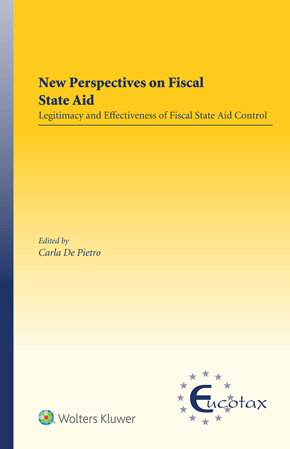 New Perspectives on Fiscal State Aid, based on a project co-funded by the European Commission, presents an in-depth analysis of the topics the project dealt with, taking a giant step towards defining the connection between effective state aid control, its legitimacy and a desirable functioning of the internal market for the twenty-first century. This book focuses on fiscal state aid – an increasingly important topic – with a number of high-profile cases ongoing and with serious implications for sustainable growth and the future of the internal market. New Perspectives on Fiscal State Aid, based on a project co-funded by the European Commission, presents an in-depth analysis of the topics the project dealt with, taking a giant step towards defining the connection between effective state aid control, its legitimacy and a desirable functioning of the internal market for the twenty-first century. This book focuses on fiscal state aid – an increasingly important topic – with a number of high-profile cases ongoing and with serious implications for sustainable growth and the future of the internal market.
The core of the project, conducted by four universities, consisted in seminars, workshops and a final conference aimed at training national tax judges from the four different countries involved (Austria, Belgium, Italy and the Netherlands), with discussion and reflection by international academics and other tax professionals who participated as speakers and/or discussants.
What’s in this book:
The core elements of this fundamental analysis include the following:
- selectivity as applied in the case law of the Court of Justice;
- whether and to what extent state aid law limits European Union (EU) Member States in designing anti-tax avoidance measures;
- protection of legitimate expectations;
to what extent national judges are required to apply state aid rules ex officio;
- powers of national judges in connection with the national obligation of guaranteeing an immediate and effective recovery on the basis of an order issued by the European Commission; and
- connection between legitimacy of state aid law and effectiveness of state aid control.
The book includes a thorough investigation of the notion of fiscal state aid by focusing on the most recent decisions of the European Commission concerning mismatches.
How this will help you:
Representing, as it does, an important and concrete contribution to the intense debate about the interpretation of the notion of fiscal state aid, with different normative views about the goals and functions of control, this book will stimulate solutions in terms of legitimacy of fiscal state aid control that also take into consideration the most desirable functioning of the internal market. Proceeding more confidently through the maze of interpretations that govern the field of fiscal state, this book with many new insights would be an asset to the series and appealing to not only academics and practitioners in taxation and EU law but also national tax judges, tax authorities and practitioners.
Contributors
CHAPTER 1
Introduction: Legitimacy and Effectiveness of Fiscal State Aid Control and the Role of National Tax Judges
Carla De Pietro
CHAPTER 2
The Legitimacy of EU Fiscal State Aid Control: What Is Your Legitimation Narrative?
Cees Peters
CHAPTER 3
Fiscal Selectivity: A Notion in Need of Clarity
Paul-John Loewenthal
CHAPTER 4
Mismatches in View of the Recent Fiscal State Aid Investigations: Genuine Situation or Intentional (Illegal) Arrangements?
Paulina Szotek & Alexandra Miladinovic
CHAPTER 5
State Aid and Domestic Anti-tax Avoidance Rules: Who Is in Charge? – A Preliminary Analysis
Daniël S. Smit
CHAPTER 6
The EU Notion of Legitimate Expectations in the Context of State Aid Law: What Role for National Judges?
Carla De Pietro
CHAPTER 7
Ex-Officio Application of EU State Aid Rules by National Courts
Marc Fierstra
CHAPTER 8
National Courts as ‘Guardians’ of Commission Recovery Decisions
Anne Van de Vijver
CHAPTER 9
Recovery Procedures and National Issues: The Belgian ‘Excess Profit Exemption’ Scheme
Bruno Peeters
CHAPTER 10
Recovery of Fiscal State Aid in the Netherlands and the Role of the National Judge
Julie Leroy
CHAPTER 11
Conclusions: Legitimacy and Effectiveness of Fiscal State Aid Control – Some Reflections on New Perspectives on Fiscal State Aid
Carla De Pietro
Bibliography
Table of Cases |
 New Perspectives on Fiscal State Aid, based on a project co-funded by the European Commission, presents an in-depth analysis of the topics the project dealt with, taking a giant step towards defining the connection between effective state aid control, its legitimacy and a desirable functioning of the internal market for the twenty-first century. This book focuses on fiscal state aid – an increasingly important topic – with a number of high-profile cases ongoing and with serious implications for sustainable growth and the future of the internal market.
New Perspectives on Fiscal State Aid, based on a project co-funded by the European Commission, presents an in-depth analysis of the topics the project dealt with, taking a giant step towards defining the connection between effective state aid control, its legitimacy and a desirable functioning of the internal market for the twenty-first century. This book focuses on fiscal state aid – an increasingly important topic – with a number of high-profile cases ongoing and with serious implications for sustainable growth and the future of the internal market.